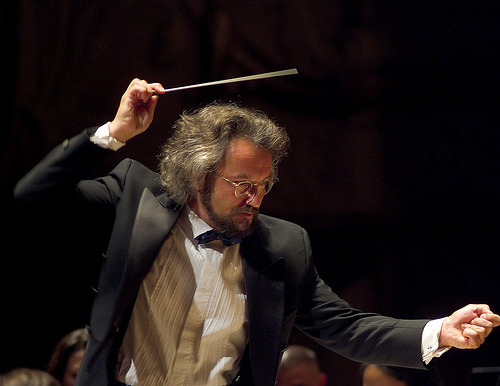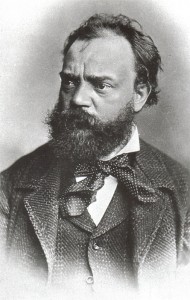Kalmar, Grant Park forces deliver electrifying account of Dvorak Requiem
Distant lightning flashes provided a dramatic visual backdrop for Friday night’s concert at Millennium Park, yet, mercifully, the rain held out until the end of the evening.
That was fortunate indeed, since Carlos Kalmar and the Grant Park Orchestra and Chorus provided their own brand of electricity in a riveting, beautifully sung performance of Dvorak’s Requiem, which made for one of the most memorable musical events of this summer.
Friday’s concert, devoted solely to Dvorak’s vast choral work, is a prime example of why Chicago’s lakefront music series is the festival of choice for discerning summer concertgoers. Where else can one experience an entire evening given up to a sprawling work for four soloists, large chorus and orchestra, which few people in attendance are ever likely to have heard before?
Even for a composer as popular as Antonin Dvorak, there are vast swathes of his oeuvre that remain terra incognita to most concert-goers. And, along with his operas—Rusalka apart—no area of Dvorak’s output has been as throughly forgotten as his choral music. Extraordinarily popular in Dvorak’s lifetime, such works as the Stabat Mater, St. Ludmilla and The Spectre’s Bride are now historic curios.
Such is also the case with Dvorak’s Requiem. As with the Requiem of Verdi, Dvorak’s setting of the Roman Catholic liturgy is an expansive work on the grand scale, and, like Verdi, the Czech composer intended his Requiem for the concert hall and not sacred services.
While Verdi’s operatic setting employs solo arias and those famous drop-into-hell choral screams, Dvorak’s Requiem is less overtly theatrical and more spiritually centered, particularly in the latter sections of Part II.
Yet, there’s no shortage of drama or expressive force in Dvorak’s setting. From the somber opening and malign terror of the Dies irae and Confutatits, to the heartfelt pleading of the Hostias, the graceful Sanctus, and the supplicatory Pie Jesu and Agnus Dei, Dvorak’s Requiem actually seems like a deeper, more balanced work than Verdi’s for all the excitement and operatic passions of the Italian’s setting.
Friday night’s performance benefited from fielding an uncommonly well-balanced vocal quartet, with four first-class soloists. Kyle Ketelesen is a familiar local figure after his fine work in Faust and Le nozze di Figaro at the Lyric Opera last season, and the American bass-baritone’s sonorous, firmly pointed vocalism provided the requisite dramatic pedal-points. German mezzo-soprano Alexandra Petersamer displayed ample tone and polished vocalism in the Recordare and Libera Me.
The two younger singers were especially fine. Brendan Tuohy showed a superb, plangent tenor and his strongly projected solo singing was a consistent pleasure.
Layla Claire, currently a Lindemann Young Artist at the Met, is clearly meant for great things. The Canadian soprano possesses a rich, luminous instrument and her sensitive, expressive singing consistently illuminated the text, with supremely affecting vocalism in the Graduale.
Scrupulously prepared by guest choral director William Jon Gray—incoming chorus director of Music of the Baroque—-the mighty massed forces of the Grant Park Chorus delivered one of their finest performances of this season, resounding and majestic in the impassioned climaxes, singing with cohesion, clarity and delicacy, and thrilling in the great choral fugues. So impressive was the ensemble work, Tuohy and Ketelsen frequently turned to listen, smiling at their choral colleagues’ vocalism.
Kalmar is at his finest in these large-scale works, and Grant Park’s principal conductor provided masterful advocacy, eliciting fiery, virtuosic playing and sustaining momentum throughout this long and demanding work. Apart from some sour woodwind tuning at the start of the Offertorium, the Grant Park Orchestra members were at the considerable top of their form, with clarion brasses, and radiant, athletic string playing. Kalmar obtained a strikingly wide palette of dynamics and tonal coloring, his attentive detailing apparent in every transition.
There is one more performance Saturday, and Chicagoans shouldn’t pass up the chance to hear this neglected rarity, especially given this level of advocacy.
The Dvorak Requiem will be repeated 7:30 p.m. Saturday at the Pritzker Pavilion. www.grantparkmusicfestival.com.
Posted in Performances







Posted Aug 14, 2010 at 11:44 pm by Chuck Burkhead
Lawrence,
Thanks for providing such a comprehensive and richly descriptive review of the performance last night. I had not planned on attending the concert and then read your review late this afternoon… decided to go based on the strength of it.
Arrived there just as it was starting and got an excellent seat that was pretty close for a last minute arrival. Editorial aside: that I was able to do so isn’t necessarily a good thing—my estimate would be about 2800 people in the fixed seats(lots of empty rows) and about 2000 on the lawn and fringe areas. For a Saturday night and no rain, that felt a little light to me—but it was pretty warm I suppose.
The soloists, orchestra,chorus, and Maestro Kalmar were all performing at a level that would be difficult to exceed. Bravo all– and the crowd certainly felt that way by the sustained applause. I had not heard the work before and am glad that there are musical treasures out there yet undiscovered and appealing at several levels.
Another aside, as I was walking across the street, I chatted with an orchestra member who was walking the same way. When I asked his impression of the Dvorak Requiem, he stated that it was pleasurable to play something that appealing and musically significant—that he had never heard before. “New World Symphony another story” he said pleasantly.
Keep up the good work with the excellent reviews.
Chuck Burkhead
Posted Aug 16, 2010 at 11:30 am by Glenn Richter
Lawrence:
I join Chuck Burkhead in praising the great comments in your review of Friday nights performance of the Dvorak Requiem. This had to be, for me, the best performance since the orchestra moved into this pavilion in 2004.
I agree that Kalmar programs a wonderful season with repertory that we never hear at the CSO. All the forces were absolutely outstanding Friday night and I will not forget this performance ever. Thanks again for your great website and truly insightful coverage of the major musical events in Chicago.
Glenn Richter
Posted Aug 16, 2010 at 1:06 pm by Lawrence A. Johnson
Gentlemen,
Thank you for your comments and kind words about Chicago Classical Review. Agreed, we’re fortunate to live in a city that can offer performances like this of such neglected repertoire.
Larry Johnson